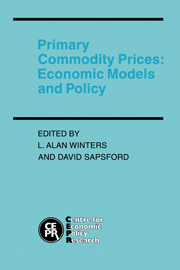Book contents
- Frontmatter
- Contents
- List of figures
- List of tables
- Preface
- List of conference participants
- 1 Primary commodity prices: an introduction to the major policy and modelling challenges
- I ECONOMETRIC ANALYSES
- II SECTORAL STUDIES: FOODS, MATERIALS AND ENERGY
- III STABILIZATION SCHEMES
- 8 The role of futures markets as stabilizers of commodity earnings
- 9 Primary commodity prices and exchange-rate volatility
- 10 Commodity policy: price stabilization versus financing
- Index
10 - Commodity policy: price stabilization versus financing
from III - STABILIZATION SCHEMES
Published online by Cambridge University Press: 05 March 2012
- Frontmatter
- Contents
- List of figures
- List of tables
- Preface
- List of conference participants
- 1 Primary commodity prices: an introduction to the major policy and modelling challenges
- I ECONOMETRIC ANALYSES
- II SECTORAL STUDIES: FOODS, MATERIALS AND ENERGY
- III STABILIZATION SCHEMES
- 8 The role of futures markets as stabilizers of commodity earnings
- 9 Primary commodity prices and exchange-rate volatility
- 10 Commodity policy: price stabilization versus financing
- Index
Summary
Introduction
The instability of world commodity markets has been a central issue in the North-South dialogue for more than two decades now. The proponents of policy intervention argue that excessive market price fluctuations cause negative micro- and macro-economic consequences which can be avoided by stabilization measures. Price stabilization policies, based on buffer stocks as intended by the Integrated Programme on Commodities (IPC) or export quotas, and compensatory financing schemes were primarily discussed as international measures to stabilize export earnings and to counter the negative consequences of world market instabilities.
Until recently, the analytical literature on price stabilization dealt primarily with commodity initiatives which fulfil their primary objectives perfectly. Analyses of price stabilization assumed that hypothetical buffer stock schemes stabilize prices successfully as intended by the decision-maker (Behrman, 1978; Nguyen, 1980). They concentrated on the consequential effects of successful price stabilization on other goals. On the basis of this approach, an argument for buffer stock schemes is that pure price stabilization can increase the aggregate welfare of all market participants. Moreover, price stabilization is expected to reduce earnings instability in many cases (Nguyen, 1980) and, hence, contribute to economic growth (Lim, 1976). In another branch of the literature, it is argued that compensatory financing systems are superior to buffer stocks and export quotas. Again, those results are based on the assumption of a perfectly stabilizing compensatory financing scheme (Newbery and Stiglitz, 1981, p. 299; Bird, 1987).
- Type
- Chapter
- Information
- Primary Commodity PricesEconomic Models and Policy, pp. 240 - 304Publisher: Cambridge University PressPrint publication year: 1990
- 4
- Cited by



